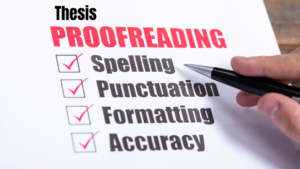At manuscriptlab, we understand the significance of producing a flawless and meticulously crafted thesis. As experts in the field, we have developed a comprehensive guide to help you master the art of Thesis proofreading. In this article, we will provide you with valuable insights and techniques to enhance the quality of your thesis, ensuring it stands out and excels in academic circles.
Importance of Thesis proofreading
Before delving into the intricacies of the proofreading process, it is crucial to emphasize the importance of this stage in academic writing. Thesis proofreading allows you to identify and rectify errors, refine your arguments, and improve the overall clarity and coherence of your thesis. It ensures that your ideas are conveyed effectively, leaving a lasting impression on your readers and evaluators.
Creating a Structured Proofreading Workflow
Establishing a systematic approach to proofreading can significantly enhance your efficiency and accuracy. By following these steps, you can streamline your proofreading process:
1. Take a Break
After completing the writing phase, it is essential to detach yourself from your thesis for a brief period. Taking a break allows you to approach the proofreading process with a fresh perspective, enabling you to spot errors and inconsistencies more effectively.
2. Read Aloud
Reading your thesis aloud is an invaluable technique that helps identify grammatical mistakes, awkward phrasing, and unclear sentences. Hearing your words can bring attention to issues that might otherwise go unnoticed.
3. Focus on One Element at a Time
To ensure a thorough Thesis proofreading process, concentrate on specific elements during each review. Start with grammar and punctuation, then move on to sentence structure, clarity of arguments, and the overall flow of your thesis. By addressing one aspect at a time, you can maintain focus and avoid overlooking crucial errors.
4. Utilize Proofreading Tools
Leveraging technology can significantly aid in the proofreading process. Tools such as grammar and spell checkers, like Grammarly and Hemingway Editor, can help identify and rectify basic errors. However, it is important to remember that these tools are not foolproof and should be used in conjunction with manual proofreading.
Manual Proofreading Techniques
While automated tools provide a solid foundation, manual proofreading is essential for a thorough and comprehensive review. The following techniques will help you refine your thesis further:
1. Review for Grammar and Punctuation
Thoroughly scrutinize each sentence for grammatical errors, including subject-verb agreement, verb tense consistency, and proper comma usage. Pay close attention to punctuation marks such as periods, semicolons, and colons to ensure they are used appropriately.
2. Check for Clarity and Coherence
Ensure that your arguments are presented clearly and coherently. Read each paragraph carefully, examining the logical flow of ideas. Verify that your sentences and paragraphs are properly linked and that the overall structure of your thesis facilitates a smooth reading experience.
3. Assess Consistency
Consistency is key to maintaining a professional and polished thesis. Examine your use of terminology, abbreviations, formatting styles, and citation methods. Consistent formatting and referencing contribute to the overall credibility of your work.
4. Verify Accuracy of Facts and Data
Double-check all the facts, statistics, and references cited in your thesis to ensure their accuracy and reliability. Inaccurate information can undermine the credibility of your work, so it is essential to cross-reference all sources meticulously.
Collaborative Proofreading
Enlisting the help of others in Thesis proofreading can provide valuable insights and fresh perspectives. Consider the following collaborative proofreading strategies:
1. Peer Review
Seek feedback from your colleagues or peers who are knowledgeable in your field of study. Their input can help identify areas that require improvement, detect logical gaps, and suggest alternative viewpoints.
2. Professional Editing Services
Engaging the services of a professional editor can significantly enhance the overall quality of your thesis. Experienced editors can provide expert advice on grammar, clarity, and structure, helping you fine-tune your work to perfection.
Conclusion
Thesis proofreading your thesis is an integral part of the academic writing process. By following the techniques outlined in this comprehensive guide, you can elevate the quality of your work and ensure that it surpasses the expectations of your readers and evaluators.
Remember, proofreading is not a one-time task but an iterative process. Continuously revise, refine, and polish your thesis to ensure its excellence. By dedicating sufficient time and effort to the proofreading stage, you will maximize the impact of your research and leave a lasting impression on the academic community.






